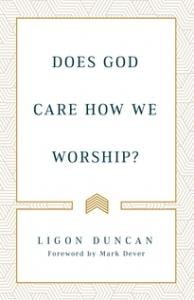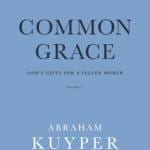“Does God care how we worship?” is the question answered, appropriately, by Ligon Duncan in his recent booklet Does God Care How We Worship?
As you might expect, the answer is not ‘no.’ This walk through of the ‘regulative principle’ lays out the defense for worship according to the principles and guidelines given to us in Scripture. Specifically, Duncan reminds us that:
“…there are two ways to commit idolatry: worship something other than the true God or worship the true God in the wrong way.” (29)

Aside from whether ‘worshiping images’ ought to be on our list of ‘ways to commit idolatry,’ this is certainly right. The question both today at at least since the Reformation, if not earlier, is who is worshiping God in the right way? Those who have a minimal view of what is required by Scripture (say, just a sermon, some kind of music, and the occasional sacrament)? Or those who want as much of the service as possible to be shaped by Scripture? Duncan’s short book helps us think about this from the latter perspective.
The first part of this book outlines the Regulative Principle and defends it from Scripture both with specific texts and from a Biblical theological perspective. The second section draws broad outlines of what the Regulative Principle looks like in its practical application.
For example, Duncan writes:
“The Reformers also understood two things often lost on moderns. First, they understood that the liturgy, media, instruments, and vehicles of worship are never neutral, and so exceeding care must be given to the ‘law of unintended consequences.’ Often the medium overwhelms and changes the message. Second, they know that the how of worship exists for the what, whom, and why of worship. The purpose of the elements and forms and circumstances of corporate worship is to assure that you are actually doing worship as defined by the God of Scripture, that you are worshiping the God of Scripture, and that your aim in worshiping him is the aim set forth in Scripture.” (75)
Unlike us, the Reformers
“…did not have the same interest in cultural accommodation as many modern evangelical worship theorists do. They were against culture-derived worship and were more concerned to implement principles of Scripture in their specific cultures… than they were to reclaim current cultural forms for Christian use. (76)
For what it’s worth, I’m only somewhat sold on the Regulative Principle. I mean, I am completely sold in that I believe if the Bible tells us to do something I think we should do it. But, what if the Bible is silent on something? Should we use rock music in the church? Or hymns? Or something else? I have my thoughts on what kind of music is the best kind of music for worship. But I don’t think I’d say that a church which uses other kinds is sinning or failing to obey Scripture or anything like that. Does that mean that I’ve just not looked hard enough to find what kind of music Scripture requires? Or does that mean that there is some flexibility in terms of music?
Anyway, that’s getting beyond the point of this book. The point here is that God does in fact care how we worship, so we had better be sure we’re worshiping the right way.
Overall, this is an excellent introduction to the Regulative Principle of Worship and is something church elders certainly ought to pick up before they start trying to put together a Sunday morning service.
Dr. Coyle Neal is co-host of the City of Man Podcast and an Associate Professor of Political Science at Southwest Baptist University in Bolivar, MO













